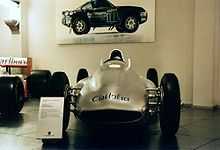Porsche 360
Porsche 360 Cisitalia is an automobile from Porsche introduced in 1949. The name Cisitalia (short for Consorzio Industriale Sportive Italia) is the name of the company that ordered the model.
History
The car was commissioned by Piero Dusio in 1946. Dusio paid a large sum of money up front, part of which was used to free Ferdinand Porsche from the French prison in which he was being held effectively for ransom. Dusio gave Porsche only 16 months to complete the car which proved too short a time to sort out the advanced design.


Design
The Dr. Porsche designed unraced 1939 1,482.56 cc (53.0 x 56.0 mm) 2-stage Roots supercharged V12 Auto-Union had been projected to deliver 327 bhp (244 kW) at 9,000 rpm. This provided the basis of the Cisitalia 360 car which was built around a mid mounted supercharged 1,492.58 cc (56.0 x 50.5 mm) flat 12 engine giving a conservative 300 hp (224 kW) at 8,500 rpm and a top speed of 300 km/h (186 mph). A fully enclosed streamlined body for fast circuits was planned giving over 200 mph (320 km/h). Later bench tests showed about 385 bhp (287 kW) at 10,500 rpm. The chassis was of chromoly tubing and featured on/off four wheel drive with a sequential gear-shift and a rear mounted transaxle also sending power through a driveshaft to a front differential. Suspension was trailing arm in front De Dion tube in the rear. Porsche's experience with the pre-war Auto Union Grand Prix cars showed through in the layout and design of the Cisitalia to the extant that it has been referred to as the "E Type".
Legacy
By the time the only prototype was finished Dusio was out of cash. The car languished in development until 1951, at one point being shipped off to Argentina to try to persuade president Juan Perón to invest in the company. By 1952 Formula One rules had changed and while Dusio attempted to source a 2 liter motor for the car a lack of funds relegated one of the most advanced Grand Prix cars of its day to a few Formula Libre events and quick retirement. The car is currently on display in the Porsche Museum in Stuttgart.
References
External links
| Wikimedia Commons has media related to Porsche 360 Cisitalia. |